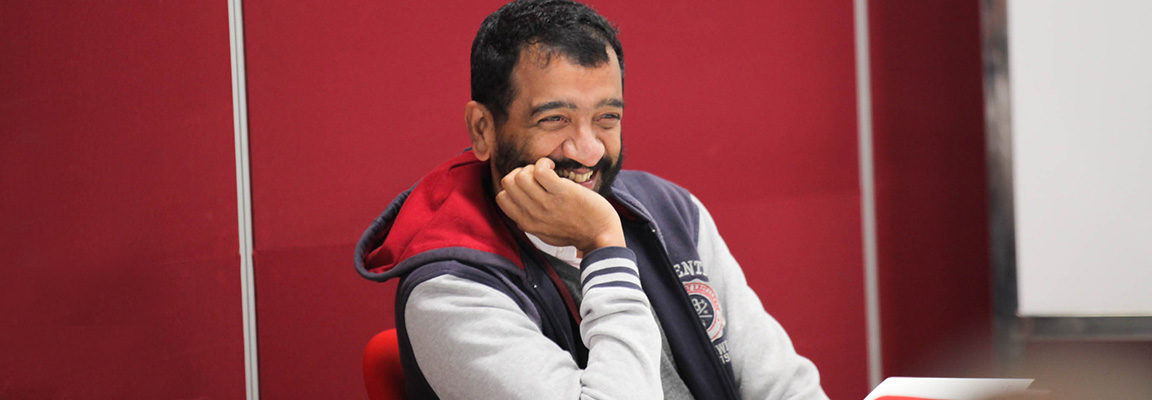


Date : Feb 12 , 2019 | Alumni
‘Trying to make a sense of this world’ is how Unny Radhakrishnan likes to describe his almost constant state of being. The January 2018 cohort of the ILSS Leadership Program would agree—in the class of 20 leaders, he was often the one with the most profound questions, the one most troubled by the relationship between society, its institutions, the powerful and the marginalised. A year since his initiation into the development sector and a few months after setting up The Social Square, Unny writes about the questions that led him to the social sector and why the answer lies in an innate human need for purpose and satisfaction.
Discovering the concept of business with purpose
Early in my career (within the first four years, in fact) I started looking for organisations doing meaningful work with some social relevance. Luckily, I did find one where I spent over seven years. Although I was not aware of the ‘social sector’ label back then, I realised that the organisation I worked for created great social impact. For example, we had a large construction labour force, who were given benefits such as PF and health cover, while executives operated at moderate salaries, where the gap between the highest paid and the lowest paid was a mere five times (today we speak about CEO pay at 300 times!).
At some point, however, it all came crashing and even the employees went bankrupt. I had to start life afresh but decided that I would get back to ‘social’ organisations once I had recovered from that hit.
Thereafter, I worked in a regular corporate setup for almost 13 years, before deciding to exit last year. One day before the ILSS Leadership Program started on January 26, 2018, I signed out of my role as Chief Digital Officer – South Asia at Wavemaker (part of WPP Group).
Looking beyond the statistics of development, with ILSS
I have always been very curious about understanding people (how and why people behave in a way), especially in the context of family, community, institutions and society. I am also deeply interested in understanding the role of corporates in society, along with subjects like economics and social sciences. ‘Trying to make a sense of this world’ is how I would like to describe myself.
The ILSS Leadership Program was an eye-opener in many ways. From our privileged positions we tend to be aware of the social challenges in a superficial manner and often just as statistics. But meeting and listening to so many inspiring and talented people who are doing great work gave me several fresh perspectives as well as the ability to question many beliefs. ILSS continues to help me by connecting to the right people whenever I need; it is also a great sounding board for new ideas.
Connecting the dots
A few months ago, I set up The Social Square, a digital community platform for people working in or interested in the social sector, including for-profit social enterprises. My hypothesis is that if different people working on multiple solutions can collaborate, share ideas and exchange learnings, there is a possibility of accelerating change. ‘Connecting the dots to accelerate change’ was the phrase running in my mind when I was thinking about this.
I am also an independent consultant for various non-profit and for-profit organisations. I work with WPP CSR Foundation to help them understand possible technological interventions and the EdTech landscape. I work with Sheroes on growth and partnerships for the platform, while I’m working on digital strategies at Cancer Awakens. I was recently invited by UNDP to talk at their APAC Communication Conference about leveraging media for communication.
I plan to take on more assignments in the coming months. Whatever I do will surely involve an intellectually stimulating/challenging role with the opportunity to stay emotionally connected with people. These two are very critical for me.
Meanwhile, I am using the time and flexibility that my current commitments offer to enhance my knowledge. I recently completed a course in Public Policy with the Takshashila Institution, a policy thinktank.
Doing good is for yourself
One of my strong beliefs is that whether we work in the social sector or the corporate, humility is a critical quality to strive for. When we choose the social sector, we have to be clear that we are doing this for our own satisfaction and not merely to solve someone else’s problem. The truth is that we are doing this for selfish reasons. Unfortunately, the word ‘selfish’ has a negative connotation. I believe that ‘self-centeredness’, not selfishness, is what needs to be addressed. Getting satisfaction is an innate human need. The earlier we acknowledge it, the better.
Date : Jul 4 , 2024
Date : Jun 27 , 2024
Date : Jun 15 , 2024
Date : Apr 5 , 2024
Date : Mar 28 , 2024
Date : Jan 25 , 2024
Date : Mar 22 , 2023
Date : Mar 15 , 2022